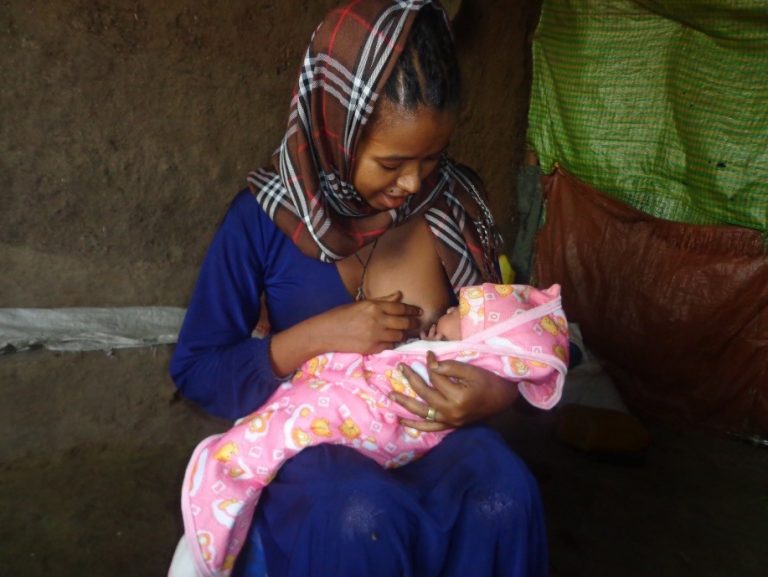By Tariku Kefyalew, program manager, Health & Nutrition, Save the Children Ethiopia.
Shitanesh Assefa was a brand new mother from Wogidi district, in the Amhara region of Ethiopia, when she found herself in a delivery room, right after delivering her first child, watching nurses and midwives work to resuscitate her baby. At 25-years-old, Shitanesh knew that the absence of her baby’s cries at birth was not a good sign, and she had to trust that the providers who helped her through the delivery would be able to take swift action to help her baby breathe. Luckily, Shitanesh and her family, unlike many women in Ethiopia, had access to a local health center with providers trained to care for babies in this exact situation.
Due to the far distance to her nearest health facility, Shitanesh did not receive any antenatal care (ANC) during her pregnancy to address her or her baby’s health, or to identify if she needed to take precautions prior to delivery. Like many women, she moved from her home village to her family’s home in Abiyegureba during her last trimester to receive care from her family during the last few weeks of the pregnancy. Shitanesh also knew there was a local health center in her family’s village, where she planned to give birth, and had the foresight to move early before her due date in case she would need to access the health facility.
After only a week in Abiyegureba, Shitanesh started experiencing contractions and her family immediately arranged for her transport to Abiyegureba Health Centre on a locally made stretcher. At arrival, the health care providers on duty assessed that she was still too early in her labor and asked her to wait in the waiting room, with her family and other patients, until her labor progressed further. After hours of progressive labor, her contractions became increasingly more intense and closer together, and the nurses moved her to the delivery room, where she gave birth.
“Right after the birth, I could not hear my baby’s cry, and the health care providers told me that my baby was not able to breathe,” Shitanesh recalls. “I became very worried when I saw them squeezing a plastic material around the baby’s mouth.” Shitanesh’s health providers had recently received training by Save the Children on newborn resuscitation and were able to take action to quickly resuscitate Shitanesh’s baby with a proper bag and mask. Supported by Johnson & Johnson, Save the Children’s “Strengthening Newborn Care” project in northern region of Ethiopia is part of the “Helping 100,000 Babies Survive and Thrive” initiative by Survive & Thrive Development Alliance. In collaboration with the Ethiopian government and Ethiopian Pediatric Society (EPS), Save the Children has trained 328 newborn care providers in all 132 facilities of South Wollo Zone to strengthen the quality of care to all newborns, including those born premature or who are sick.
After Shitanesh’s midwives successfully resuscitated her daughter and proceeded to weigh the small infant, the providers learned that Shitanesh’s baby was of low birthweight and needed special care to regulate her temperature and support her feeding. As in many low-resource settings, the health center did not have any specialized equipment, such as incubators, to care for preterm or small babies like Shitanesh’s daughter. Fortunately, a method called “Kangaroo Mother Care” was developed to help preterm babies grow stronger with support from the mother, who must provide frequent breastfeeding in addition to prolonged skin-to-skin contact to the preterm baby. Shitanesh’s nurses taught Shitanesh how to hold and wrap her daughter against her chest, skin-to-skin, and how to breastfeed her daughter properly to help her regain strength.
“I practiced to put my daughter on my chest for almost more than six weeks, following all the instructions they gave me.” With this care and continued postnatal follow-up visits, Shitanesh was able to help her daughter gain weight and grow strong. Now two-months-old, her daughter has gained weight and is eating well.
Shitanesh is fortunate that she was able to access a health center for her delivery, and that the providers on duty had the training they did to care for her and her daughter. “I did not expect my small baby would grow this way. I am so thankful to all health care providers for the support given to my daughter to survive.”
